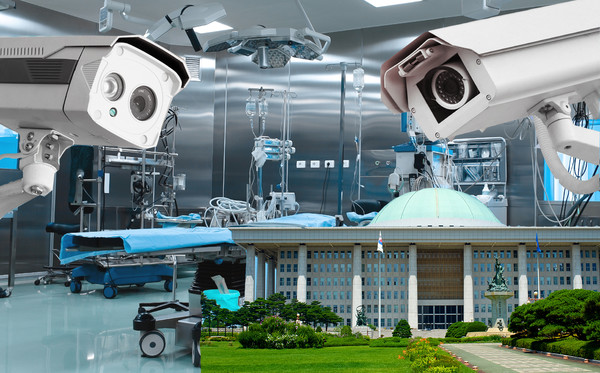
With the revised law mandating the installation of CCTVs in operating rooms starting from September, hospitals are gearing up for the implementation. However, within the clinical field, there remains a lingering sense of confusion surrounding the precise details regarding the installation and operation.
For example, a debate still goes on how to interpret the provision that stipulates hospitals film and record the operation if patients and their guardians request so. The Ministry of Health and Welfare said that recording is not mandatory and does not have to be done unless the medical workers involved in the surgery agree.
The Medical Service Act stipulates that "when hospital heads or medical professionals film a surgical scene, they cannot use the recording function.” However, another provision states, "This shall not be the case if they win the consent of the patient and others participating in the operation.”
Still, some hospitals tend to interpret that "if a patient or guardian requests it, they must make a recording with the consent of the entire medical staff.”
“If patients and their guardians ask for it, we have to record the surgery, but this requires the consent of all the medical staff participating in the surgery," said a provincial hospital official in a recent phone interview with Korea B Biomedical Review. "The process of obtaining full consent is burdensome because we often do not know who will participate in the surgery.”
There are already growing concerns and conflicts in hospitals about who should go around gathering consent forms when parents or patients ask for recording, the official said, adding that if this should continue, hospitals may have to hire separate personnel to collect consent forms.
Hospitals also need clarification about whether hospitals must install equipment that can record sounds in the operating room because most CCTVs only film scenes.
"CCTVs that can record are scarce, so it's not easy to install them," the official said. "Since national university hospitals are public institutions, they must install equipment through companies registered with the Public Procurement Service (PPS) or through open bidding. However, there are only two such companies, so it is not easy to install them in time."
The official went on to say, "Our hospital tried to bid for the contractor we signed last year. However, due to recent changes in the Ministry of Education's cybersecurity policy standards, CCTV security has been strengthened, and our previous partner could not meet the standards. Bidding is also difficult."
Pointing out that the purpose of installing CCTV in the operating room is to prevent proxy surgeries, the official said he couldn’t know why recording should be so critical.
“University hospitals don't receive subsidies for installation, so I'm very worried,” the official added.
The Ministry of Health and Welfare said medical institutions do not need to worry much about CCTV installation and recording.
"The Medical Service Act has provision related to recording, so we have also worked out rules concerning 'request for recording' in its reinforcement rules,”
said an official at the ministry's Health and Medical Policy Division." "Accordingly, to make a recording, the heads of medical institutions must obtain letters of consent from all subjects of information, including medical personnel participating in the surgery."
In the case of recording with the consent of all information subjects, they can use the recording function added to the CCTV or use a separate recording device, the official said, adding that separate recording devices are those people usually use.
Related articles
- [Column] A world we’ve never experienced before: Installation of closed-circuit televisions in operating rooms
- Almost all doctors oppose CCTV in operating room as implementation nears
- [Top 5 Medical News in 2021] Korea, the only country to mandate cameras in operating rooms…
- Doctors threaten to boycott surgery in protest to mandatory CCTVs in OR
- Physicians petition Constitutional Court against new operating room CCTV mandate
- Hospitals ask for delaying CCTV checks due to installation rush
- Will operating room CCTVs become useless due to ‘consent issue’?

